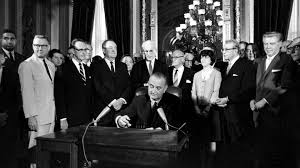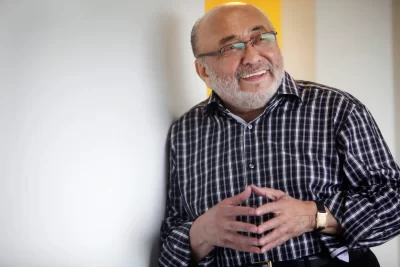
WASHINGTON — Wednesday is the 60th anniversary of the day President Lyndon Johnson made his way to the U.S. Capitol and, with Martin Luther King Jr. standing behind him, signed the Voting Rights Act into law.
The act protected the right to vote and ensured the government would fight efforts to suppress it, especially those aimed at Black voters. For many Americans, it was the day U.S. democracy fully began.
That was then.
The law has been slowly eroding for more than a decade, starting with the 2013 Supreme Court decision ending the requirement that all or parts of 15 states with a history of discrimination in voting get federal approval before changing the way they hold elections. Within hours of the ruling, some states that had been under the preclearance provision began announcing plans for stricter voting laws.
Those changes have continued, especially since the 2020 presidential election and President Donald Trump’s false claims that widespread fraud cost him reelection. The Supreme Court upheld a key part of the Voting Rights Act in 2023, but in its upcoming term it’s scheduled to hear a case that could roll back that decision and another that would effectively neuter the law.
Voting rights experts say those cases will largely determine whether a landmark law passed during a turbulent era decades ago will have future anniversaries to mark.
“We’re at a critical juncture right now,” said Demetria McCain, director of policy at the NAACP Legal Defense Fund. “And, let’s be clear, our democracy is only about to turn 60 when the Voting Rights Act anniversary gets here. I say that because there are so many attacks on voting rights, particularly as it relates to Black communities and communities of color.”
Native Americans celebrate a win that could be temporary
The reservation of the Turtle Mountain Band of Chippewa Indians is about 10 miles (16 kilometers) from the Canadian border, a region of forests, small lakes and vast prairie land. Its main highway is a mix of small houses, mobile homes and businesses. A gleaming casino and hotel stand out, not far from grazing bison.
In 2024, the tribe and another in North Dakota, the Spirit Lake Tribe, formed a joint political district for the first time. They had filed a lawsuit arguing that the way lines were drawn for state legislative seats denied them the right to elect candidates of their choice. U.S. District Court Chief Judge Peter Welte agreed and put a new map in place.
State Rep. Collette Brown ran for the legislature because she wanted to see more Native American representation, and she won under the new map.
“It felt surreal. I felt accomplished, I felt recognized,” said Brown, a plaintiff in the lawsuit and the Spirit Lake Tribe’s Gaming Commission executive director. “I felt, OK, it’s time for us to really start making change and really start educating from within so that we’re not silenced.”
Brown, a Democrat, co-sponsored several bills on Native American issues that became law, including aid for repatriation of remains and artifacts and alerts for missing Indigenous people.
This year’s anniversary of the Voting Rights Act “forces you to look at how far we’ve come,” from Native Americans to women, said Jamie Azure, chairman of the Turtle Mountain tribe.
Now the future of their district is in the hands of the Supreme Court.
Will individuals be allowed to file voting rights challenges?
The 8th U.S. Circuit Court of Appeals, which covers North Dakota and six other states, overturned Welte’s decision 2-1, saying the tribes and entities such as the NAACP Legal Defense Fund and the ACLU do not have a right to sue over potential violations of voters’ constitutional rights.
That ruling expanded on an earlier 8th Circuit opinion out of Arkansas that rejected a different challenge on the same grounds. Late last month, a 3rd Circuit court panel ruled in a separate case out of Arkansas that only the U.S. attorney general can file such cases — not private individuals or groups.
Those decisions upended decades of precedent. The Supreme Court has stayed the ruling for the tribes while it decides whether it will take the North Dakota case.
The University of Michigan Law School Voting Rights Initiative found that since 1982 nearly 87% of claims under that part of the Voting Rights Act, known as Section 2, were from private individuals and organizations.
Leaving individuals without the ability to file challenges is especially troublesome now because the Justice Department under Trump, a Republican, seems focused on other priorities, said Sophia Lin Lakin, who heads the ACLU’s Voting Rights Project.
The government’s voting rights unit has been dismantled and given new priorities that, she said, have turned enforcement “against the very people it was created to protect.”
The Justice Department declined to answer questions about its voting rights priorities, cases it is pursuing or whether it would be involved in the voting rights cases coming before the nation’s highest court.




